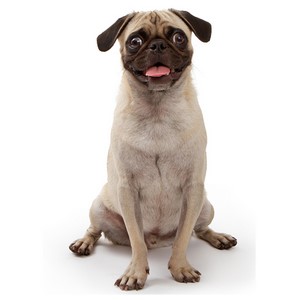Pug Dogs Health Problems
Looking to own a Pug and want to know what are the common diseases or health problems that Pugs are prone to?
According to pet experts, Pug Dogs score  out of 5 in the scale of breeds that are considered the most healthy dog breeds.
out of 5 in the scale of breeds that are considered the most healthy dog breeds.
What Diseases Are Pug Dogs Prone to?
-
Are Pugs hypoallergenic: No
Dog Breeds with The Least Health Issues
Looking for a pet dog breed that won't break the bank with visits to the vet? Have a look at our list below. But, remember that your pet's health is ultimately up to you.
1. Australian cattle dog - This lively breed of dog is well known for its intelligence, dexterity, and stamina. As a relatively healthy breed, the Australian cattle dog does not have a background of serious illnesses and may live up to 13 years with proper training and appropriate preventative care.
2. Border Collie - Advancements in DNA testing have made it easier to control the relatively few minor genetic conditions known to affect border collies. As a high-energy dog with a life expectancy of up to 14 years, the Border collie is a great choice for active individuals and young families-- just be ready to provide her with lots of outdoor playtime and exercise.
3. German Pinscher - This agile and muscular dog is not often associated with major health conditions, and may live up to 14 years with proper care and plenty of exercise.
4. English Springer Spaniel - Though this mild, cordial breed of spaniel is sometimes known to suffer minor eye problems, it is usually less likely to suffer from many major genetic diseases. A healthy English springer spaniel may live up to 14 years.
5. Chihuahua - With love and attention, this pint-sized pooch species can live up to 18 years. The Chihuahua's petite size means it normally needs less physical exercise than other breeds of dogs.
What to do if you lose your Pug
If your Pug Dog or any other pet has gone missing and it does not have an identification tag with a phone number, you can:
1. Register your missing pet details at Pet Reunite website here.
2. List the missing pet on the Local Facebook Lost Pets Groups Here.
3. Phone the nearby vet clinics to see if someone has brought in your missing pet.
4. Phone the RSPCA or Visit the RSPCA Lost Pets website and complete a Lost Pet Report.
5. Visit Lost Pets Pages of Animal Pounds.
What to do if you find a lost Pug
If you find a Pug Dog or any other pet and it does not have an identification tag with a phone number, you can:
1. Report the found pet details at Pet Reunite website here.
2. List the missing pet on the Local Facebook Lost Pets Groups.
3. Phone the Local Council to collect the lost animal.
4. Take the animal to the local Animal Shelter assigned to your area.
5. Take the pet to the local Vet who usually scan the animal’s microchip and contact the registered pet owner.
Laws Regarding Missing Pets
1. It is against the law to keep any animal that you find.
2. Pets are generally considered property and it is illegal to take and keep someone else’s property.
3. You must call your local animal control unit and file a FOUND AN ANIMAL report for any dog or cat you find.
4. To reclaim your lost dog, cat or other pet from the animal shelter you must pay a release fee.
5. If your dog or cat is unregistered, you will have to register your pet before you can take it home.

